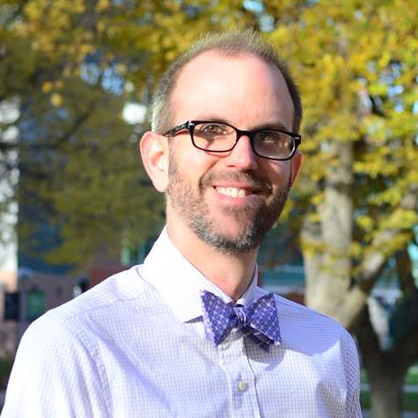A necessary part of the scientific process is sometimes being wrong, and Eric Pietras, PhD, was wrong. He’s the first to admit it.
When Pietras, a University of Colorado Cancer Center member and associate professor of hematology, joined the CU School of Medicine in 2015, a significant body of research suggested that inflammation activated blood-forming stem cells, which normally are dormant in bone marrow.
“A lot of papers in the experimental hematology field were suggesting that chronic inflammation makes blood-forming stem cells turn on to produce new immune cells that are potentially harmful to the host,” Pietras explains. “But what my team and I started finding in various models of chronic inflammation, is that I was wrong. Inflammation can turn the activity of stem cells down, rather than up.”
This research, some of which was conducted in close partnership with James DeGregori, PhD, CU Cancer Center deputy director, led to a series of five papers and two different avenues of research that recently received grant support from the Edward P. Evans Foundation and a Research Scholar Grant from the American Cancer Society, which supports investigators within their first 10 years of faculty appointment.
Studying stem cells as the root of blood cancer
Pietras’ research is further informed by the discovery that while inflammation can turn down normal stem cells, it also can promote the selective growth of rare stem cells that have acquired cancer-associated gene mutations. “Inflammation can elicit special properties of these mutant stem cells that allow them to be selected for in bone marrow,” he explains. “The mutations often endow the stem cells with the ability to ignore the ‘off’ signal or even increase their activity.”
As a hematopoietic stem cell biologist – hematopoietic stem cells are immature cells that can develop into all types of blood cells – Pietras’ research was initially focused on how inflammation affects the function of normal, healthy stem cells. He has recently used this background to become focused on how inflammation can promote the growth of stem cells with gene mutations at different stages of blood cancer pathogenesis. Pietras’ Discovery Research Grant from the Edward P. Evans Foundation will support research in his group targeting inflammatory metabolic and epigenetic dysregulation in myelodysplastic syndrome (MDS), a largely incurable group of cancers in which immature blood cells in bone marrow don’t mature correctly into healthy blood cells.
“We’re really looking at how inflammation can trigger the special properties of MDS stem cells, particularly how they acquire and use energy, that help them to survive and prosper in the bone marrow while normal stem cells turn down their activity," Pietras explains. "In this way, inflammation may serve as a partner to the development of deadly blood cancers like MDS and acute myeloid leukemia (AML)."
He adds that a lot of research has focused on studying blood cancers at later stages, rather than in earlier myeloid malignancy.
“For decades, we’ve been faced with the scenario that a diagnosis of MDS or AML can be a death sentence for patients,” he says. “For decades we’ve struggled to find good therapies, and to this day colleagues like Dan Pollyea, MD, and Craig Jordan, PhD, here at the University of Colorado have been at the forefront of identifying what the best therapies are for patients with myeloid malignancies. Our work complements their efforts by asking how we can intervene earlier, by understanding what’s abnormal about these mutant stem cells, how inflammation makes them tick, and what we can do to suppress that.”
Understanding the partnership between inflammation and gene mutations
A lot of research is studying how to stop inflammation as a risk factor for cancers, “and we’re certainly a part of that effort. Our work is focused on understanding what inflammation is actually doing to change the way mutant stem cells obtain and use energy, and how this accelerates their growth,” Pietras says.
Through the course of their research, Pietras and his study partners have found that inflammation can trigger or amplify metabolic properties in mutant cells that let them grow more rapidly, potentially increasing the risk of developing MDS and AML. The American Cancer Society grant supports his work aimed at understanding these metabolic properties and how inflammation activates them. These studies could help his team identify new ways to target oncogenic processes long before they develop into leukemia.
“We began to understand the process of oncogenic transformation in blood-forming stem cells as a collaboration between mutations in the genome, the inflammation that’s part of aging and disease, and the metabolic properties activated by the inflammation,” Pietras explains. “The way we conceptualize it is the way a firefighter explains the fire triangle to schoolkids: You have heat, oxygen, and fuel, and if you take away any one of those you extinguish the fire. We’re thinking of it in similar terms. If we target inflammation or metabolism, we potentially restore normality in the bone marrow and reduce the risk of leukemia development.”
His work will also further an avenue of research studying dietary interventions and their impact on metabolism. “We’re thinking about this holistically, because we may find that common features of modern Western lifestyle, particularly diet, may affect risk for leukemia by changing the interplay between inflammation and metabolism in ways that benefit mutated stem cells," Pietras says. "It’s to all our benefit if we can understand more clearly how dietary interventions could potentially play a role reducing the risk of leukemia development.”
Header illustration: Kirk Moldoff/MDS Foundation




